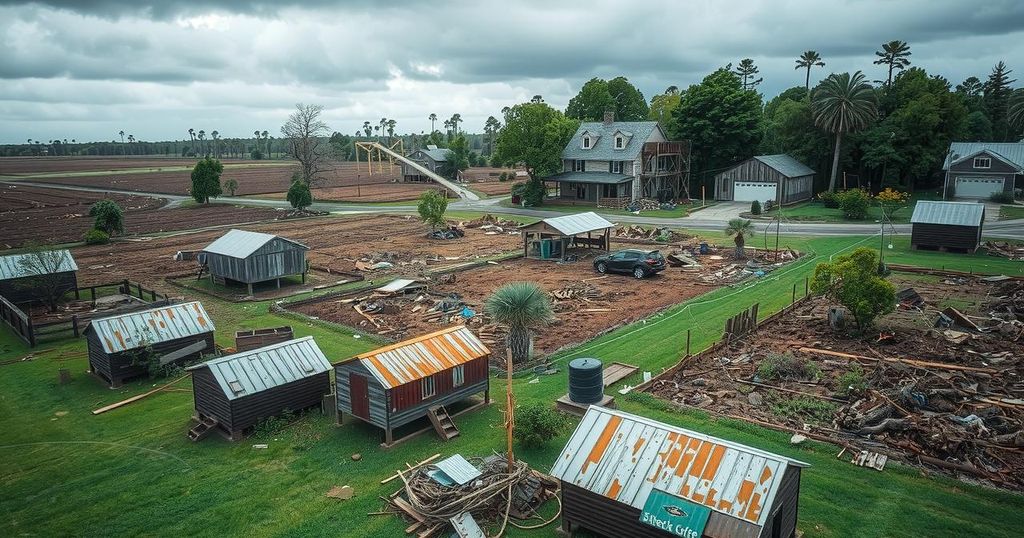Ongoing Recovery for Farmers After Hurricane Helene’s Devastation

Farmers in Georgia are still recovering from the severe impacts of Hurricane Helene, which caused extensive damage to crops and infrastructure over two months ago. The storm, which made landfall as a Category 4 hurricane, resulted in an estimated $10 billion in agricultural losses across several states. Immediate recovery efforts and financial assistance are critical as affected farmers, like Chris Hopkins and Jeffrey Pridgen, face daunting rebuilding costs against a backdrop of emotional and economic challenges.
Farmers in Georgia continue to grapple with the devastating impacts of Hurricane Helene, which struck the region over two months ago, devastating crops and operations across the South. Major agricultural losses have been reported, including damaged cotton, squash, cucumbers, and pecan trees. Chris Hopkins, a local farmer, described the emotional toll of the disaster as he works to clean up his farm, emphasizing the dilemma of whether to rebuild or abandon their efforts.
The hurricane, classified as a Category 4 storm, made landfall in Florida on September 26 before wreaking havoc across Georgia and neighboring states. Experts estimate that the total cost to the agricultural sector could exceed $10 billion, factoring in destroyed crops, broken equipment, and lost productivity at processing facilities. In Georgia alone, losses have been analyzed to exceed $5.5 billion. Many farmers are still in recovery mode, particularly those involved in cotton production, which faced critical timing as harvest began during the storm.
Despite insurance coverage, significant recovery costs remain unaddressed, including an estimated $430,000 in losses for Hopkins from just his cotton crop. The storm also adversely affected pecan orchards and poultry houses, with several farmers sustaining far-reaching losses. Even farmers situated far from the storm’s center experienced devastation, as the storm’s winds extended up to 310 miles.
Georgia’s government has taken steps to aid affected farmers by reallocating funds for emergency loans, although constitutional restrictions limit direct financial support to individuals and businesses. Meanwhile, farmers like Jeffrey Pridgen, whose poultry houses were destroyed, face daunting rebuilding costs that jeopardize their operations and livelihoods.
Despite the scale of damage, economists predict that the impact on consumer prices may be minimal, with alternative crops being available to offset shortages, although pecans may face a different situation. As cotton prices remained low, many farmers had already been struggling before the storm struck, compounding the challenges they face as they attempt to recover from the dual blows of recent hurricanes.
In the wake of Hurricane Helene, which struck the southeastern United States in late September 2022, farmers across Georgia and beyond continue to face extensive agricultural losses. Helene was a severe Category 4 hurricane that resulted in considerable destruction to various crops and significant damage to farming infrastructure. The combination of high winds and unprecedented rainfall has left farmers contemplating the future of their livelihoods, as they assess the damage to their lands and equipment. With estimates of losses reaching critical levels, the regional agricultural sector is bracing for long-term impacts, necessitating immediate assistance and recovery efforts.
In summary, Hurricane Helene’s impact on farmers in Georgia and the surrounding Southern states has been profound, with billions in estimated losses across various sectors of agriculture. Farmers face not only the physical destruction of their crops and infrastructure but also emotional burdens as they weigh the future of their operations. While there are governmental efforts underway to provide financial aid, the path to recovery remains uncertain and challenging for many. As they navigate this difficult period, farmers continue to express the urgent need for timely support and resources to help them rebuild their farms and livelihoods.
Original Source: abcnews.go.com







